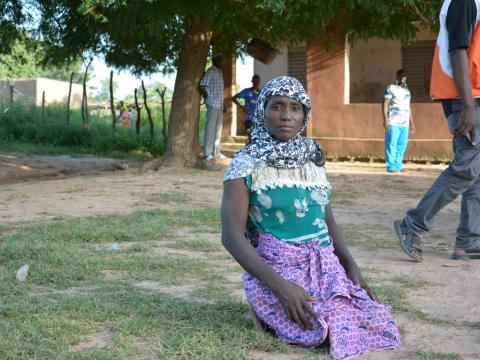Cash distribution supports more than 240 households to meet urgent needs

By Fousseni Koné – Emergency Communications Officer (Intern)
Insecurity in central Mali is not the only emergency requiring humanitarian action for the country. In fact, despite international agreements on human rights and the article of the constitution declaring that "All Malians are born free and equal in rights and duties", some communities are still struggling to put an end to certain practices linked to tradition in their environments.
Today, families such as those of 43-year-old disabled mother of six, Mania, face discrimination in rural areas; on top of several other struggles in certain regions of Mali.
“I live in Mambri with my family, and two years ago, we fled our homes to survive abuse from a group of people at Sakora village”, she shares. According to her, the unwanted displacement to Mambri village was a result of violence and situations that disadvantaged them in terms of citizenship and rights, preventing thousand of victims like her from holding important positions in their native village.
“There [Sakora], they were beating, killing and taking from us all our belongings such as lands we farmed and our cattle. They claimed that we were slaves. Regrettably, we could not stand the physical and mental torture that we were undergoing, so we were obliged to leave the village”, regrets Mania.
Although some communities have succeeded in opposing this phenomenon, experience from Mania proves that there are still some battles to overcome in order to put an end to the practice in other parts of the country, as she continues to teach us.
“This situation has badly affected us because we were tortured and stolen from. We have left our homes empty-handed. We are happy to see that some good people stand by our side in this difficult moment that we are living”, says Mania.
In early 2021, a rapid assessment indicated that this massive forced displacement has driven more than 240 households, including that of Mania, to look for shelter at Mambri and Suranssan villages.
“As we came with nothing, our living conditions are very difficult here. Unfortunately, we do not have enough to eat; my children sometimes eat once a day. Last year, we farmed the land shared with us by local farmers of Mambri, but due to the lack of farming equipment, we found nothing after harvest”, Mania explains.
In light of the daily suffering experienced by Mania who was brave to have shared her sorrowful experience with us, as well as others in a similar situation, World Vision in partnership with the World Food Programme (WFP) was able to help them through a cash distribution which was made last September.
“My husband is about 67 years old. We used to survive thanks to the little money our children earned at doing daily works for natives of Mambri. Now, with this cash support I received, I will be able to help my spouse at meeting the family’s food needs for the three coming months”, Mania tells us with a smile.
Furthermore, the mother of six has revealed that the most important factor for her is to be able to look after one of her children who has been lucky to be sent to school by his father. Mania's greatest happiness is to financially respond her child's needs.
“I have my last 19-year-old boy who is in high school in Bamako, and I am very happy that our problem did not affect his studies. I will do my best to help him. Thanks to World Vision and WFP, I will now be able to send him little money that I received”, she shares with a hopeful demeanour.
Mania’s family is grateful for the money received at the cash distribution, which reached more than 240 internally displaced person households; each with a support of 36 000 CFA (67 US dollars) for three months from September to November 2021. This will cover food needs for them.